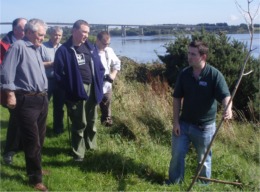GARDENERS across the North West are being warned
about the threat of invasive non-native plant and
animal species to the local environment. The warning
followed a recent training session in Derry by
biodivesity officer Julie Corry.
Ms Corry said the majority of invasive species in
Northern Ireland and the Derry area are non native
and many were negatively impacting on our native
species. They can transform our local habitats and
threaten whole ecosystems, causing serious problems
to the environment and economy, she explained. She
also said that most invasive species in the local
area had been introduced by humans either
intentionally or by mistake. |
"Plants were quite
often escapees from gardens especially large estate
gardens or private collections. They can damage
natural habitats like woodlands and bogs by taking
over and out competing native species."
Two common invasive plant species locally are
Japanese knotweed and Himalayan balsam. |
 |
These are common along
roadsides and riverbanks. They spread quickly and
reduce the diversity of other plant life.
"Himalayan balsam is best controlled by pulling and
removing it before the flower head and seeds
develop. Japanese knotweed however spreads
vegetatively i.e. a small section of stalk can
re-grow if transplanted. Due to the vigour of this
species it is actually an offence under the Wildlife
(NI) Order 1985 to purposely spread it. Anyone
seeking advice to control this species is advised to
read Best Practice advise from Invasive Species
Ireland via the following website
www.invasivespeciesireland.com .
An Invasive Species Action Plan has now been drawn
up in Derry aimed at reducing the threat to native
biodiversity by controlling non-native invasive
species and their spread where possible.
As part of the plan, Derry City Council recently
held a training session and visit to Bay Road Park
Local Nature Reserve for staff and partners to
showcase how best to control some of the key local
invasive species. John Early from the Northern
Ireland Environment Agency who led the training
added: "It's vitally important we get the key
message out to the public and to organisations who
can help fight the battle against invasive species.
The easiest thing they can do is record where and
when they see an invasive species such giant hogweed
or a grey squirrel and report this on
www.invasivespeciesireland.com . |

